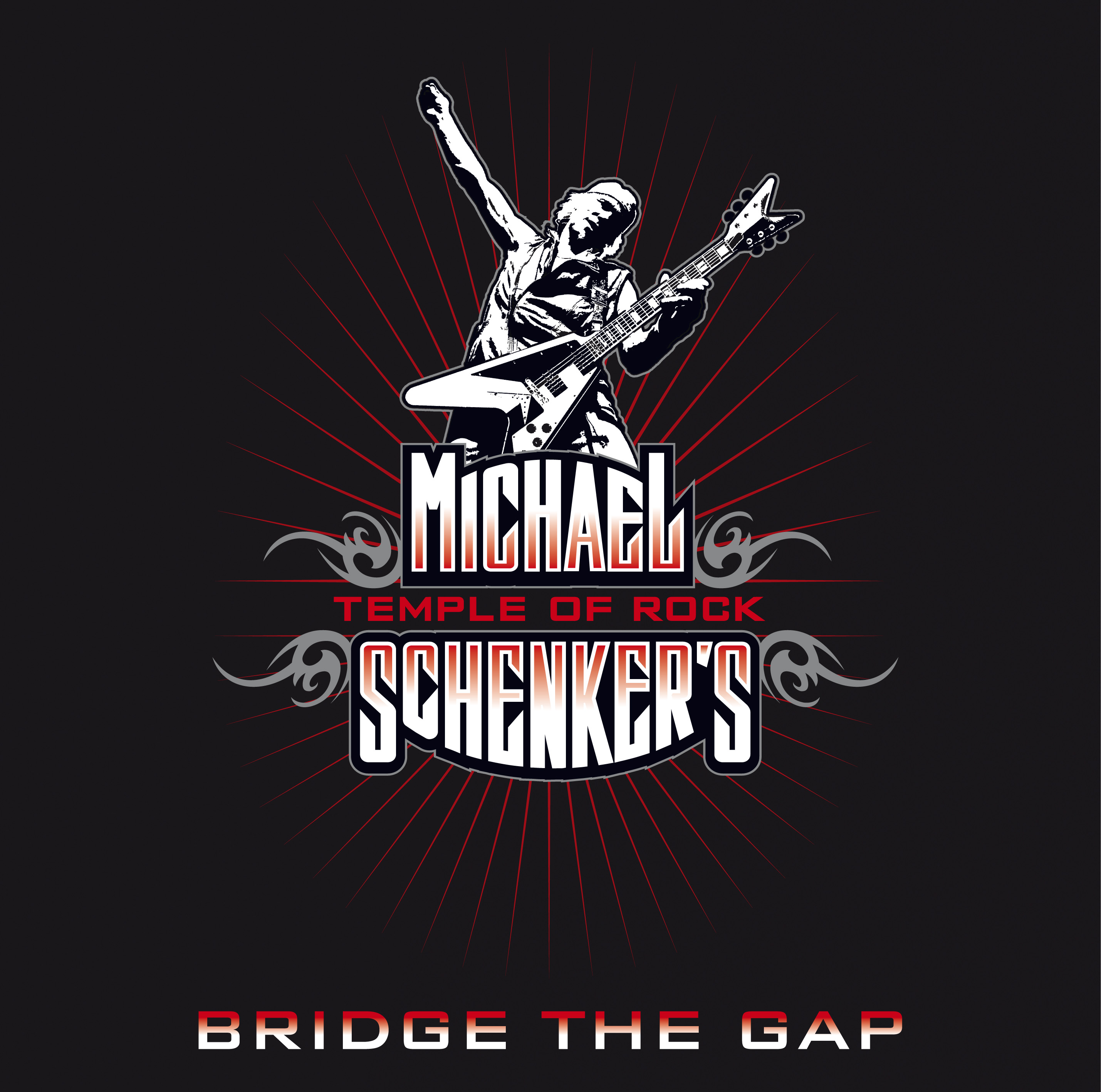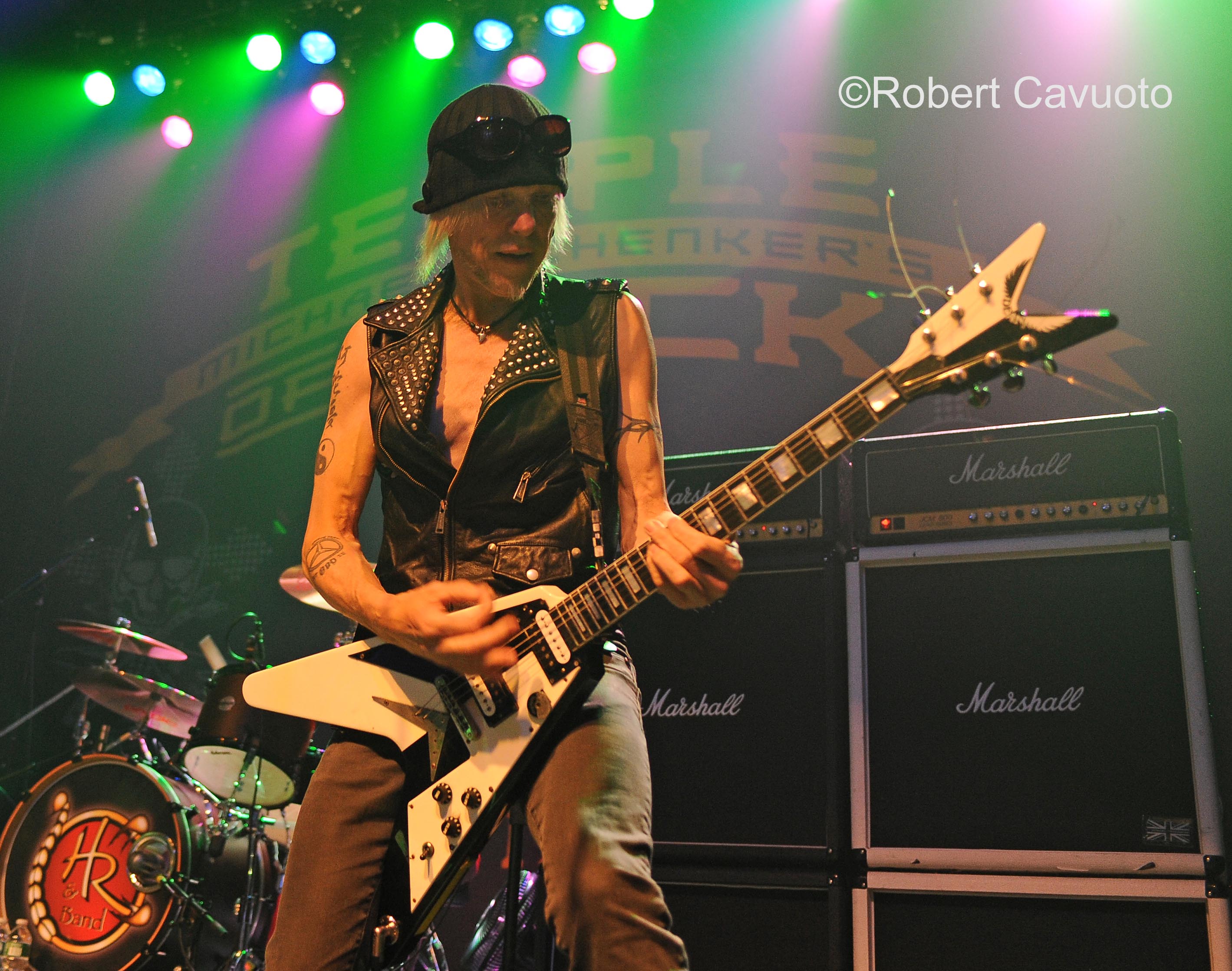By: Robert Cavuoto
Michael Schenker has been called one of the true guitar heroes of all time and has influenced three generation of players.
Schenker’s career resume includes historical bands like UFO, the Scorpions, as well as several iterations of his solo group the Michael Schenker Group.
On his newest release, Bridge the Gap, he has united with the original Scorpions rhythm section that include: bassist Francis Buchholz and drummer Herman Rarebell – as well as enlisting ex-Rainbow singer Doogie White, plus guitarist/keyboardist Wayne Findlay.
Even Don Dokken lends his vocals to an exclusive track, “Faith”, which is only available on the album’s deluxe edition.
Bridge the Gap is loaded with blazing attitude, hard driving riffs and melodic hooks, a true testament to Michael’s success as an innovative guitarist and songwriter.
I had the pleasure of speaking with Michael about his latest release, as well as discussed with him how his style and guitar technique has evolved and grown since his days with UFO.
******
 Robert Cavuoto: Tell me about the importance of finding your own style after playing guitar for 35+ years.
Robert Cavuoto: Tell me about the importance of finding your own style after playing guitar for 35+ years.
Michael Schenker: It’s all about pure self-expression. I’ve focused on that since I was 17 years old. I intuitively knew I should not listen to anybody else’s music, I should not copy any music, I should just create.
Basically, living like a monk, staying away from external music and just having fun creating. I was then able to express colors that have never been seen or been expressed before. We all have colors, we all have something to be expressed that cannot be felt or heard, unless we express it. If you keep doing that, you automatically create a particular type of sound that’s truly unique. Being able to be myself is the most important thing.
Robert: You’ve done so many great albums, how does this Bridge the Gap compare to your previous work?
Michael Schenker: This is a very special album because it’s the closest I have ever gotten to a true band. We have Doogie White; he’s an excellent vocalist and a great showman. We have Herman Rarebell and Francis Buchholz the original rhythm section of Scorpions. We have Wayne Findley who plays a fantastic 7-string guitar and keyboard. So, it’s all the way up there for me.
Robert: I think the CD title really ties nicely with the vibe of the CD about bridging the gap between the past with Herman and Francis and the present with new players and an updated sound. Tell me about your thinking behind it.
 Michael Schenker: I’ve only done one CD with Herman and Francis, which was Lovedrive in the ‘70s with the Scorpions. For various reasons, we disappeared out of the loop.
Michael Schenker: I’ve only done one CD with Herman and Francis, which was Lovedrive in the ‘70s with the Scorpions. For various reasons, we disappeared out of the loop.
With Bridge the Gap we are all coming back almost simultaneously and making our second record together. I already knew the album title before I even went in the studio starting to record or before writing. I said to everybody, “It’s going to be called Bridge the Gap. When I gave Doogie the material, I said “Think bridge the gap and think melodic.”
Since Wayne has developed nicely on the 7-string, I decided to combine the 7-string with a lower big sound and of the Marshall. In that way, it takes the old, the new, and everything in between then puts it all together. And of course, the way all the stuff happening on the planet there’s a communication gap going on. It seems to be a good title for many reasons.
Robert: I was very excited to hear that Herman and Francis were in the band, but disappointed that you were not bringing them to the U.S. for the tour.
Michael Schenker: I too am disappointed, but would have been even more disappointed if we didn’t have any shows in the States for the release of the CD. We were planning to go to the States with the album lineup but didn’t want to do a premature tour.
I decided to do a smaller scale tour, so I could be there on the 7th of December when the album was released, as well as introduce Doogie to the States and let people know about the upcoming tour. Our tour starts in Japan in March and then off to Europe. Towards autumn will come back to the States with the album lineup.
Robert: That’s great news. Is it difficult to juggle different players for different counties and getting everyone up to speed?
Michael Schenker: When I did the first Temple of Rock album with Michael Voss singing, he wasn’t available for a world tour, as he signed a solo deal. I had to improvise and created various lineups. We are playing material from five different lineups with five different singers. So, I had Robin sing in America and Michael Voss in Japan and Doogie White in Europe.
Pete Way wasn’t doing so well and so the European tour in 2011/12 is when we started with Doogie. Then Wayne was playing bass and he wasn’t doing too well, so I asked Herman to check on Francis to see what he was up to. He was more than happy to do this tour.
So I had Francis and Doogie, and that was the moment when this whole thing started to develop into a band. It actually got better and better, almost on a daily basis. So I decided to quickly do a DVD just in case the band wouldn’t last. We picked a location in Holland which was the most convenient for our routing and organized a video crew for a one-day shoot. Because of it we were getting more and more offers for the European tour – so many offers that we had to add a second leg to the European tour.
And so the first leg finished at the end of September, and the beginning of the second leg of Europe April 2013. So for those six months I decided to make an album. We finished the album by the 31st of March. What started out as a problem actually became a very good thing.
I put the CD away and carried on with the tour. At end of the tour around August I played it to the guys with fresh ears. We knew immediately what we could do better. So we added new stuff to it, remixed it, remastered it, and we think it is now better. It was an interesting experience to say the least.
 Robert Cavuoto: My favorite song on the CD is “Lord of the Lost and Lonely.” Could you share some insight into that track?
Robert Cavuoto: My favorite song on the CD is “Lord of the Lost and Lonely.” Could you share some insight into that track?
Michael Schenker: I always write the same, but play and discover on a regular basis. When I bump into something I like, I record it on a cassette recorder, like a 5 or 10-second pieces. When it’s time to make an album, I listen to what I have. For “Lord of the Lost and Lonely” I had the main chorus riff which inspired me to write the verses. Doogie added incredible vocals and great lyrics with a really good hook. That’s how it came about. It turned out to be a really good song. It has a lot of elements in it, heaviness, melodies, and the whole spectrum of emotions.
Robert Cavuoto: Tell me about song writing process, do you work together as a band with the riffs you’ve saved or do you bring completed songs to them?
Michael Schenker: For this album, I just looked at what I had. We had six months to get it all together. I started writing around the clock to add to my riffs. By the end of the year, I was ready to give it to Doogie.
But for the next record, I want to try something that I used to do long, long time ago at the very beginning of UFO. We used to sit together in a rehearsal studio, and somebody starts a riff and then everybody joins in on the spot to play what they feel. So, I already have an idea for how the next album will start off.
Robert Cavuoto: You’re an amazing guitarist. Tell me how your technique as a guitar player has evolved and grown.
Michael Schenker: It evolves all the time. I always discover new things. That’s the most exciting part of my career.
The first album I ever made, Lonesome Crow, was an unbelievable experience. Then moving to England and joining an English band, making that type of music. I could hardly speak English and made my first record with a British band.
You could hear the development of my guitar playing, almost on a yearly basis from record to records all the way up to Strangers in the Night. I call that period my development period.
My middle years were all about experimenting, developing, learning and overcoming. Now I’m in the third stage of my life, which is all about celebration. I celebrate my life and I celebrate my generation of rock. That’s how I see everything and consistently developed. I love to learn; I love to move forward and accept the past for what it was.
Robert Cavuoto: I spoke to your brother Rudolf a couple of months back, and we discussed how he made the Flying V guitar his trademark. Tell me how you also made it your trademark guitar.
Michael Schenker: The combination between the Flying V and the 50-watt amp was the sound that was the most similar to what I heard in my head. I was 15- or 16-years-old, and have played the same ever since because you get used to the shape when you play it on a regular basis. The way you hold it, and the way you need to balance it. So after a while you become so used to it –if it works, don’t fix it, and you adapt to the shape. It’s awkward to hold an ordinary guitar.
Robert Cavuoto: When you play songs live from 30+ years ago, do you approach them differently from how they were recorded or do you play it exactly how it was recorded?
Michael Schenker: I always inject some freshness, some new elements, to create some excitement with the basic structure of what the song is all about. You do that so it it doesn’t get boring.
 Robert Cavuoto: I always wondered about your involvement on the Scorpions album; Lovedrive? You’re credited on the CD but you’re not on back cover photo, what role did you play?
Robert Cavuoto: I always wondered about your involvement on the Scorpions album; Lovedrive? You’re credited on the CD but you’re not on back cover photo, what role did you play?
Michael Schenker: Lovedrive was a very important album for the Scorpions. I had just left UFO and my brother found out. They started recording and Matthias Jabs wasn’t capable of doing the whole album to the level that was expected. So when my brother heard I had left UFO, he asked me if I could help out.
He sent me a tape with material like “Coast to Coast,” “Holiday,” “Lovedrive” “Another Piece of Meat” and I think “Always Somewhere.” I wrote all the melodies on “Coast to Coast,” the intro solo to “Holiday” all sorts of bits and pieces on “Lovedrive” and the solos for “Another Piece of Meat.” It opened the door to America.
I couldn’t continue with them, because I needed to follow my own dream, which was to keep my own pace and having space and room to explore musically. It was my vision and my desire. I was not really interested in big fame and success, as I already had a taste of it with UFO. I knew that was not what I really had to have. To me, it was more important for freedom and being able to experiment musically, that’s where my passion was.
I left the scene, and my brother took over. He needed it more than I did; [Laughter] but we both were enjoying what we were dreaming about. He was enjoying the success of the Scorpions, and I was enjoying my life as a guitar player. Both of us followed our dreams, he putting together one of the most successful bands in the world, and I was focusing on becoming a great guitar player. We both followed our vision and desire and stuck with it.
Robert Cavuoto: You’ve accomplished so much in your career; what’s your greatest musical accomplishment so far?
Michael Schenker: Basically, that I kept true to myself and kept expressing myself. That’s what I feel like I’m here for, like a spirit on a mission to the joy of music from a place of pure self-expression. And that’s what I enjoy most – to add my color to the world. That’s what my passion is.
Michael Schenker: “I Knew The Album Title Before I Went In The Studio” - Rock Confidential (10 years ago)
[…] To read the interview in its entirety, visit this location. […]
MICHAEL SCHENKER: “I Knew The Album Title Before I Went In The Studio” | Metal Shock Finland (World Assault ) (10 years ago)
[…] To read the interview in its entirety, visit this location. […]